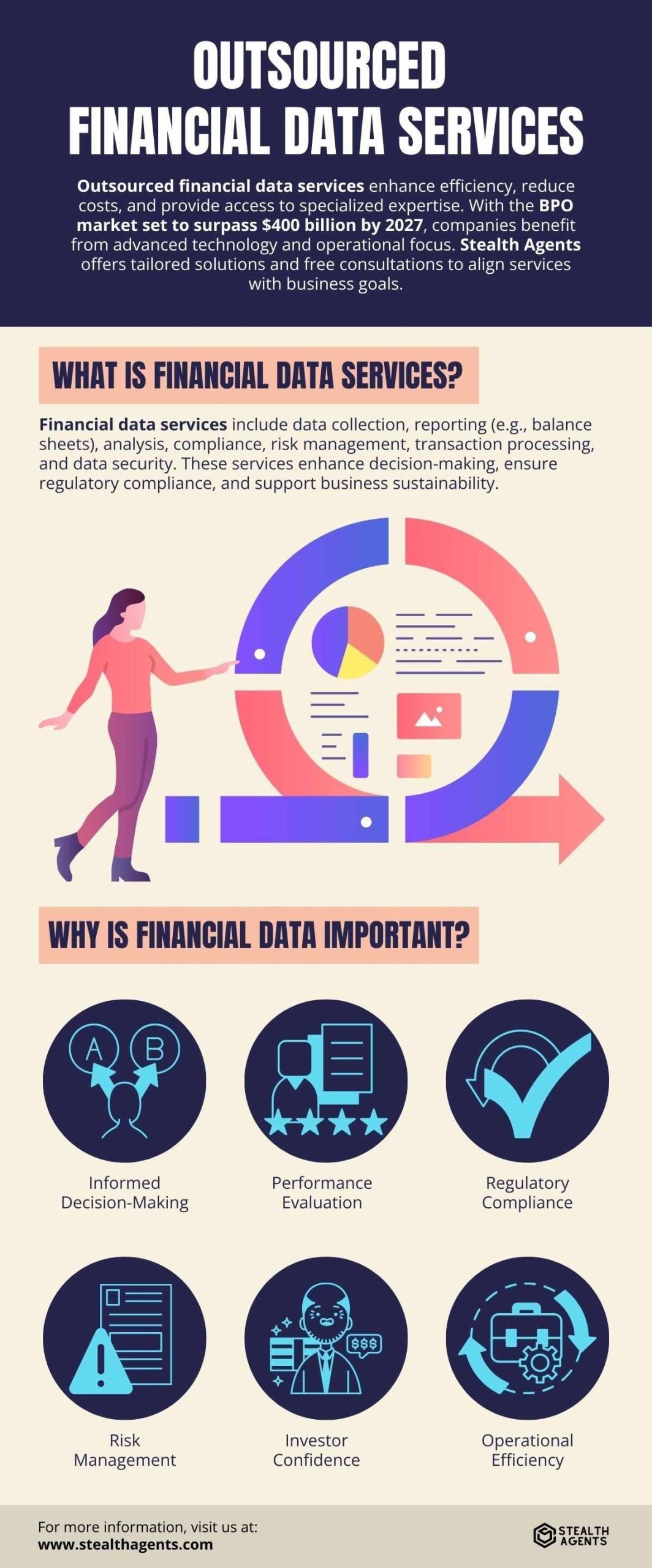Outsourced financial data services have emerged as a strategic solution for companies striving to enhance efficiency while reducing costs.
As businesses face increasing pressure to manage complex financial data, many are turning to outsourcing, a trend that has grown significantly in recent years.
The global business process outsourcing market is projected to reach over $400 billion by 2027, highlighting its importance in modern business operations.
Outsourcing financial data services offers numerous benefits, including substantial cost savings, access to specialized virtual assistant expertise, and improved operational efficiency.
By leveraging external resources, companies can allocate their internal resources more effectively, focus on core business activities, and benefit from the latest technological advancements without the hefty price tag.
Stealth Agents provides an excellent opportunity for businesses eager to explore these advantages.
They specialize in helping companies find the right outsourced financial data services tailored to their needs.
A complimentary discussion will allow you to discover how their virtual assistant pricing aligns with your business goals, ensuring a seamless transition to outsourced solutions.
What is Financial Data Services?
Financial data services encompass various activities essential for effectively managing and analyzing financial information.
These services include data collection and management, which involves gathering and organizing financial data from various sources, such as transactions and market data.
Financial reporting is a crucial component. Defined reports such as balance sheets, income statements, and cash flow statements are prepared to summarize a business’s economic performance.
In addition, financial data services involve data analysis to identify trends, make forecasts, and support business decision-making strategies.
Compliance and business risk management stategies are also critical. They ensure that all financial practices adhere to regulatory requirements while managing potential risks associated with financial transactions.
Furthermore, transaction processing handles the execution of financial tasks such as payments, billing, and payroll, while data security protects sensitive financial information from unauthorized access and breaches.
These financial data services companies are vital for businesses as they maintain accurate financial records, enhance decision-making capabilities, and ensure adherence to regulatory standards, supporting overall business health and sustainability.
Why is Financial Data Important?
1. Informed Decision-Making
Financial data equips businesses with the insights necessary to make strategic decisions that can shape the company’s future direction.
By analyzing trends and patterns within financial statements, management can identify opportunities for growth and areas requiring improvement.
This data-driven approach enables businesses to allocate resources more effectively, ensuring that investments yield the highest possible returns.
Additionally, financial data helps set realistic goals and benchmarks, guiding companies in their long-term planning and forecasting.
It also allows for evaluating different scenarios, aiding in selecting the most advantageous marketing strategies for small business.
Ultimately, the ability to make informed decisions based on financial data can lead to sustainable competitive advantages.
2. Performance Evaluation
Financial data is a vital tool for assessing how well a business performs in terms of profitability, efficiency, and growth.
The analysis of profit margins, return on investments, and cost structures provides a clear picture of the company’s financial health.
Regular performance evaluations using financial data help identify trends over time, making it easier to spot consistent growth or areas of decline.
This continuous assessment allows businesses to adjust their operations or strategies to enhance performance.
Stakeholders, including investors and management, rely on these evaluations to make critical decisions about future investments and leadership directions.
Moreover, performance evaluations based on financial data can also highlight the success of past initiatives, guiding future innovation strategies business.
3. Regulatory Compliance
Maintaining accurate and up-to-date financial data ensures that a business complies with legal and regulatory standards.
Compliance with financial regulations helps avoid costly fines, penalties, and legal entanglements that could arise from inaccuracies or fraudulent activities.
Regular audits and outsource quarterly financial reporting ensure transparency and accountability, crucial for maintaining trust with regulators and stakeholders.
Furthermore, compliance with financial regulations can enhance the company’s reputation, demonstrating its commitment to ethical business practices.
Financial data also supports internal governance by providing a framework for accountability and control within the organization.
By adhering to regulatory requirements, businesses can operate smoothly within the industry’s legal landscape.
4. Risk Management
Financial data is critical in identifying potential risks and developing strategies to mitigate them effectively.
Businesses can detect early signs of financial distress or fraud by analyzing patterns and anomalies in financial transactions.
This proactive approach allows companies to implement safeguards and controls to protect their assets and maintain operational integrity.
Financial data also aids in stress testing, helping to assess how different risk scenarios could impact the business.
Effective risk management through financial data analysis ensures business continuity by preparing organizations for unforeseen events.
Moreover, it supports strategic planning by identifying potential risks affecting future growth and profitability, allowing for informed decision-making and contingency planning.
5. Investor Confidence
Transparent and accurate financial data builds investor confidence by providing a clear and honest view of the company’s financial position and potential for future success.
Investors rely on financial statements to gauge the viability and profitability of their investments, making reliable data crucial for attracting and retaining investment.
Consistent financial reporting reassures investors that the company is well-managed and financially stable, fostering long-term relationships.
This trust can lead to increased investment and support, facilitating growth and expansion opportunities for the business.
Clear communication of financial data and performance can also enhance the company’s market reputation and attract new investors and partnerships.
By maintaining investor confidence through robust financial data, businesses can secure the financial backing needed for future endeavors.
6. Operational Efficiency
Financial data helps businesses identify inefficiencies within their operations that may be affecting profitability.
By analyzing cost structures and expenditure patterns, companies can pinpoint areas where savings can be achieved without compromising quality or service.
This detailed understanding allows for the streamlining of processes, reducing waste, and improving resource utilization.
Financial data also supports the implementation of business performance metrics terms and benchmarks, aiding in the continuous improvement of operations.
Enhanced operational efficiency reduces costs and improves the overall customer experience by ensuring timely and quality service delivery.
Ultimately, leveraging financial data to improve operational efficiency can lead to increased profit margins and a stronger competitive position in the market.

How Do You Tell if You Need to Outsource Financial Data Services?
1. Resource Limitations
Many businesses encounter challenges when their internal teams lack the specialized skills to manage and analyze financial data.
This can lead to errors or inefficiencies in financial reporting, impacting decision-making and strategic planning.
For instance, a small business might not have the resources to hire a full-time financial analyst or outsource financial data entry service.
In such cases, outsourcing offers access to a pool of experts who can provide the required skills and insights without the overhead of permanent staffing.
By engaging with outsourced financial data services, businesses can leverage otherwise inaccessible expertise, allowing for more accurate and timely financial reporting.
2. Cost Efficiency
Hiring and training in-house staff for financial data management can be expensive, especially if the required skills are highly specialized.
Outsourcing can present a more economical solution by allowing businesses to pay for services as needed rather than maintaining a full-time team.
For example, a company might only need extensive financial analysis during the tax season or quarterly reporting periods.
By outsourcing, they can eliminate the costs associated with full-time salaries, benefits, and training, and instead allocate those resources towards other critical business functions.
This approach not only reduces overheads but can also improve profitability by ensuring that financial data is managed efficiently and accurately.
3. Scalability Needs
As businesses grow, their financial data management requirements often become more complex and voluminous.
Outsourcing offers a flexible solution that can scale with a business’s needs without requiring substantial changes to its internal processes.
For instance, a startup experiencing rapid growth might face increased transaction volumes and require more sophisticated financial analysis.
Outsourcing allows them to quickly ramp up the services they need without the delay and cost of recruiting and training new staff.
This scalability ensures that financial data management can keep pace with business growth, thus supporting continued expansion and success.
4. Focus on Core Activities
Managing financial data internally can be time-consuming and may divert attention from a company’s primary business activities.
For a business whose primary expertise lies outside of financial management, such as a tech startup focused on product development, outsourcing can help redirect focus back to core competencies.
Through outsourced financial data services, businesses can relieve their internal teams of the burden of financial data management, allowing them to concentrate on strategic objectives and growth initiatives.
This focus can lead to improved efficiency and a stronger competitive edge in the market, as resources are directed toward areas that directly contribute to business success.
5. Technology and Tools
Staying abreast of the latest financial technologies and tools is crucial for accurate data management and regulatory compliance.
However, investing in these technologies can be costly and require ongoing updates and maintenance.
Outsourced financial data service providers typically have access to cutting-edge tools and software, ensuring that the businesses they serve benefit from the latest advancements in financial data management.
For example, a company might need advanced analytics software to process large datasets, which could be prohibitively expensive to purchase and maintain internally.
By outsourced financial data services, businesses gain access to these tools without the associated capital expenditure, enabling them to maintain compliance and data accuracy while focusing on strategic growth.
Why Choose Stealth Agents Outsourced Financial Data Services?
Choosing Stealth Agents for outsourced financial data services offers businesses a wealth of benefits that can significantly enhance their financial data management.
With a team of seasoned professionals, Stealth Agents brings a high level of expertise that ensures accuracy and compliance in financial reporting.
Their cost-effective solutions allow companies to access top-notch services without the overhead costs of an in-house team.
Utilizing advanced technology, Stealth Agents provides cutting-edge tools and software, enhancing data accuracy and efficiency.
Their virtual assistant data services tailor solutions to fit each client’s unique needs, ensuring that they address common challenges such as data integration and scaling operations.
By partnering with Stealth Agents, businesses can focus on their core activities while having peace of mind that their financial data is managed expertly, ultimately supporting business growth and strategic decision-making.

Takeaways
Outsourced financial data services present a strategic advantage for businesses looking to optimize their financial data management.
By integrating these services, companies can achieve significant cost savings while gaining access to industry expertise and advanced technologies, enhancing data accuracy and compliance.
Outsourced financial data services streamline operations and free up internal resources, allowing businesses to focus on growth and strategic decision-making.
This approach can be instrumental in navigating complex financial landscapes and maintaining a competitive edge.
Businesses seeking to improve their financial data processes should consider outsourcing as a practical and effective solution to achieve their objectives.












